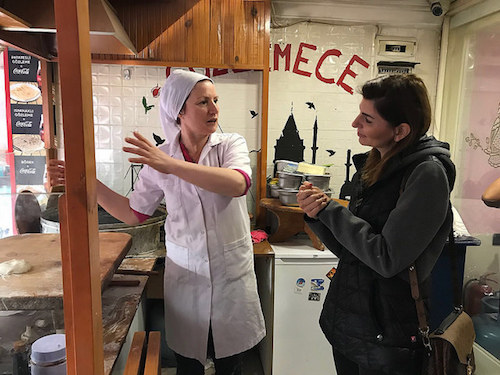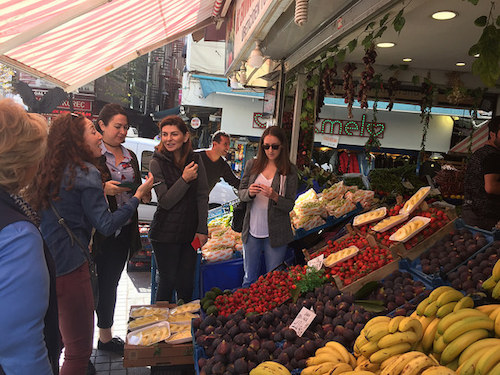WDI Partnering to Lift Refugees Through Food Entrepreneurship
Tuesday, October 17, 2017

A member of the LIFE project consortium speaks with a Turkish business owner of a small crepe restaurant about her perspective on hiring people of different cultures, including Syrian refugees.
Two WDI representatives traveled to Turkey earlier this month as part of the Institute’s work on a project, led by the Center for International Private Enterprise (CIPE), that aims to develop sustainable livelihoods in the food sector for Syrian refugees and their host communities.
WDI Senior Project Manager Kristin Babbie Kelterborn and WDI Faculty Affiliate Peter Scott traveled to Istanbul and Gaziantep to collaborate with other project partners to conduct a mapping and discovery process to understand the specific needs of the target populations.
The project, “Livelihoods Innovation through Food Entrepreneurship,” or LIFE, will set up Food Enterprise Centers (FECs) in the two Turkish cities to train 20-40 entrepreneurs at a time on how to run food-based businesses. The centers will serve as incubators, and in addition to a kitchen, will feature space for meetings, co-working and training.
Scott has experience teaching entrepreneurship courses at various universities, conducting entrepreneurship training programs in Bahrain and Papua New Guinea, and has advised over 20 start-ups as a business development consultant. Kelterborn supports WDI’s Entrepreneurship Development Center (EDC) and brings her academic training in the sociology of food and agriculture, as well as her previous experience providing business development support to food and agriculture-based businesses at an accelerator, to the project.
During the trip, Kelterborn and Scott participated in a mentorship environment assessment, and developed a summary of the trip with a detailed action plan for upcoming program phases.

Members of the LIFE project consortium visit a produce stand in Turkey and interview the owner on how a green grocer sources his produce. The team sought his perspective on how he could potentially benefit from the LIFE Food Enterprise Center.
WDI will also develop tools for establishing an entrepreneur mentoring program at the FECs. Finally, WDI is represented on the Steering Committee of the LIFE project. In this capacity, the Institute will provide entrepreneurship-related advice and expertise on the structure and setup of the FECs and contribute ideas for a local ownership model to promote sustainability beyond the lifecycle of the program, among other duties.
The FECs will also provide workforce development training for an anticipated 1,000 workers in the food sector covering topics such as food and beverage management, procurement, and customer service skills.
In addition to CIPE and WDI, other members of the project consortium are: Union Kitchen; IDEMA (International Development Management); and, The Stimson Center.
Turkey has the largest refugee population in the world, including more than 3 million Syrians, a number that stood at about 170,000 at the end of 2012. Most of the Syrians entering Turkey have fled the country’s civil war. Formal unemployment among the refugee population is high, and tensions have flared between refugee and citizen communities.
The food sector in Turkey is a promising pathway for Syrian refugees to strengthen their livelihoods, ultimately benefitting the Turkish economy and society. Using food as a means of cross-cultural engagement and understanding, known as “gastrodiplomacy,” is a main focus of the LIFE project.
“Food is an effective way to foster cross-cultural connections,” said Amy Gillett, vice president of WDI’s Education Initiative and the EDC. “The South Koreans are known for ‘kimchi diplomacy’ – forging ties globally and building a strong country brand through popularizing their famous fermented cabbage and dishes such as bibimbap. We hope to see similar goodwill arise from this project, with Syrian specialties like manoushi bread and fatteh reaching more palates and opening up new opportunities for Syrian refugees.”
